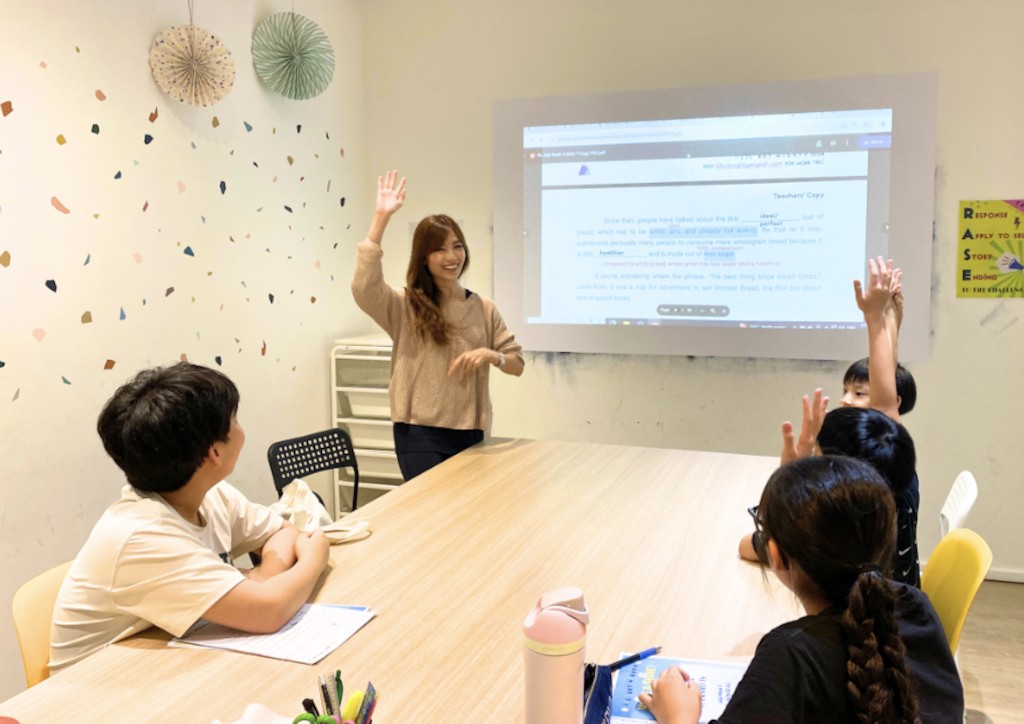SingaporeMotherhood | Preschooler & Up
November 2024
PSLE Oral in 2025: What’s New & Strategies to Ace It

Generations of Singaporean students — yes, including you and me — have overlooked the Oral exam until it’s around the corner. Yet we consistently practise writing compositions and tackle past years’ written exam papers, often all year long. But starting next year, the PSLE English examination will place a greater emphasis on the Oral component. In fact, PSLE Oral will now account for 40 marks instead of the previous 30 marks.
According to educator Lily Chew, this change reflects the Ministry of Education’s focus on enhancing students’ verbal expression and real-world communication skills. We ask the founder of English tuition centre Lil’ but Mighty to explain the changes in PSLE Oral from 2025. She also offers holistic strategies and practical tips students can use to ace the PSLE Oral exam.
(See also: Normal or Express – PSLE Streaming Conflicts between My Boy and His Dad)
Changes to the PSLE Oral Exam
Firstly, the Reading Aloud component will increase from 10 to 15 marks. Accompanying this is a change in the task requirement. Instead of a text alone, a preamble (a statement at the beginning) which states the Purpose, Audience, and Context (PAC) is provided. Thus, students are to read aloud the text to suit the PAC of the given situation.
Secondly, the Stimulus-based Conversation component will increase from 20 to 25 marks. The stimulus will simultaneously become more authentic with the use of a photograph. Additionally, the Reading Aloud and Stimulus-based Conversation components will no longer share a common topic, something which was true in previous oral examinations.
Overall, the new PSLE Oral format focuses very much on authentic tasks and social situations. This means that every scene around us can potentially become a stimulus.
Since these changes take effect from PSLE 2025, the other primary levels are likely to be introduced to them gradually. However, it is likely that individual schools will decide how and when they will roll out these changes.

How These Changes to PSLE Oral Affect Students
The increased focus on the Oral component is a positive effort toward developing confident and effective young communicators. Being able to be assertive and share how they feel will also help our little ones grow in confidence and assist their social-emotional development.
Looking at the world around us now, it is clear that the ability to communicate thoughts, ideas, and feelings is more important than ever. Additionally, expressing one’s thoughts and ideas with clarity is essential in helping one think critically and collaborate with others. These are expected of 21st century English learners in Singapore, especially as they enter the workforce.
That being said, these changes may be daunting to students, especially since the oral tasks are changing as well. The Oral component is an assessment, after all and some students view it as the most challenging compared to other components because it is akin to a live performance in front of an audience.
Truly, it is not merely about how well a student converses in English. Instead, students will need to know the task requirements and expectations in order to do well.
(See also: PSLE English Oral: A Practical Guide for Students and Parents)
Impact on a Student’s Overall PSLE English Grade
With the Assessment Level (AL) scoring system, we can see that AL5 to AL4 requires a 10-mark jump, while from AL4 onwards, every five marks will lead to a jump to the next band. Therefore, seizing 10 more marks can potentially help a child jump up to two bands!
It is worth noting that from 2025, Oral will carry a higher weightage than Continuous Writing (Composition). Parents might wish to reconsider giving more attention and putting in more effort to help their children become effective communicators.
However, keep in mind that every mark in the PSLE English examination still carries the same weightage. Therefore, a balanced approach with an awareness of the child’s strengths to know what to focus on will still be most helpful in helping them achieve their best during the PSLE.

Strategies to Help Your Child Ace PSLE Oral
To excel in the new PSLE Oral component, students need a firm understanding of the requirements and how to fulfil them. Lily shares some strategies to help students and parents navigate the new format:
1. Know the requirements
In order to be confident in tackling the task, we first need to have a firm understanding of the requirements. Then, we need to know how to fulfil them. It definitely helps to have the right guidance and exam-smart strategies in order to perform during the examination. Hence, do clarify any doubts you have with your teachers as a first step.
2. Consistency in practice is key
It is not uncommon to hear of how Oral is a component which students neglect, and then practise only when an examination is nearing. Having more regular and consistent practice even without the Oral exam being round the corner will help a child build confidence and familiarity with its requirements.
3. Start on and work on areas of strength
Focus on your child’s strengths to build confidence and maximise scoring opportunities. For example, if Reading Aloud is their strong suit, don’t overlook it in favour of Stimulus-Based Conversation. After all, it now carries 15 marks instead of 10, which is a boost for sure.
While working on Stimulus-Based Conversation, also start with what your child is comfortable with. Since there are no changes in format for Q2 and Q3, consider starting there, rather than Q1 with the new stimulus.
(See also: Speaking off the Cuff: 10 Tips to Help Your Child Improv like a Pro)
4. Make use of daily scenes
Since the new format focuses very much on authentic tasks and social situations, every scene around us can potentially become a stimulus. It will help for parents to engage their children in conversation when they are out and about. Bear in mind that nothing is too ordinary to be talked about.
For instance, while waiting for the train at the platform, try sparking a conversation about the posters on the doors. Questions like “What do you think is going on in this scene? How do you think the person is feeling?” can be asked during a short span of time. Even without a visual stimulus, students can also reflect on a situation they witness, such as when someone gives up a seat in the train for an elderly person.
5. Organise what you want to say
Having a structure and strategy that helps you present your answer in an organised manner makes it easier for the examiners to follow what you are sharing. Best of all, when faced with a challenging question posed to you, you can fall back on the strategy to help lead you to provide a complete answer that is sufficiently developed. Connectors like “firstly”, “next”, and “finally” will help with organising your points.

6. Be expressive but always link back
Feelings matter and give a personal touch to any conversation. To stand out, feel free to express how you feel about a situation or a past experience. For example, you can share how you were proud, glad, relieved, or livid. Giving personal responses helps to engage the examiner, but remember to show that what you are sharing is relevant to the topic and focuses on the question.
7. Language matters
Since this is an English examination, you will need to use accurate grammar and vocabulary, on top of complete sentences, in your answers. Try to avoid words or phrases you are unsure of, as well as mundane words like “nice”, “interesting” and “happy”. Also steer clear of slangs in this formal examination setting unless it’s part of a specific anecdote.
Any sharing will be more interesting than silence. You cannot return to say more after it’s over, so be daring to share during the examination. Then walk out of the examination hall proudly!
– Lily Chew, founder of Lil’ but Mighty
Lily has been dedicated to helping primary and secondary students strengthen their English skills since 2015. As a mother of four boys aged one to 10, she experiences the joys and challenges of parenthood firsthand — learning from their struggles, celebrating their milestones, and striving to be both their best teacher and biggest cheerleader. Lily’s passion for teaching and her commitment to nurturing young minds continue to shape her journey as an educator and mother.
All content from this article, including images, cannot be reproduced without credits or written permission from SingaporeMotherhood.
Follow us on Facebook, Instagram, and Telegram for the latest article and promotion updates.





